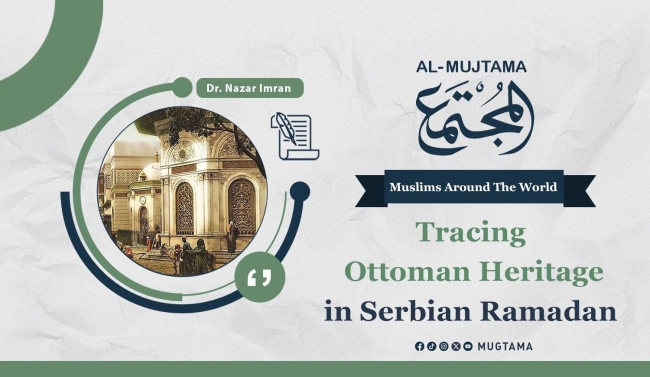Tracing Ottoman Heritage in Serbian Ramadan
Ramadan in the Republic of Serbia is considered a celebratory month in areas where Muslims reside, such as the Sandžak region, predominantly inhabited by Bosniak Muslims, and in the Preševo Valley, where the majority are Albanian Muslims.
In Sandžak, during this holy month, Muslims adhere to prayers, filling mosques. They also gather before the Asr prayer, a Bosniak Ramadan ritual, where a proficient Quran reciter recites the Quran beautifully and efficiently.
As for the Taraweeh prayers, they hold special significance in the Sandžak cities, where mosques are filled with worshippers. Muslims prioritize performing this prayer in the mosque more than other prayers, as it is also a social occasion dedicated to the month of Ramadan. After the prayer, friends gather and exchange greetings, socializing during Ramadan evenings.
In the cities of Sandžak and the Preševo Valley, streets empty before Iftar, and Muslims eagerly await the sound of the Ramadan cannon, which accompanies the call to Maghrib prayer, signaling the end of their fasting.
Ramadan banquets are usually filled with traditional local dishes, often including various types of pastries with meats and local juices. Muslims tend to consume a specific type of bread made during Ramadan.
In recent decades, it has become customary to break the fast by eating dates with juice or milk, then attending the Maghrib prayer, after which they return to have their full meal.
Desserts are also present on Ramadan Iftar tables in Serbia. However, the types of food in Sandžak differ from other regions of Serbia, as they are more influenced by Turkish cuisine.
Collective Iftar gatherings are a fundamental tradition in the cities of Sandžak, typically organized by religious institutions, Islamic schools, charitable organizations, and even some institutions and political parties. Generally, relatives visit each other during Ramadan and invite each other to Iftar.
Local television stations celebrate the month of Ramadan by presenting religious and educational lectures by various preachers and scholars. They also broadcast recitations of the Quran, as well as religious Nasheed, social programs, and festive Ramadan activities such as Ramadan competitions or visits to Ramadan banquets to observe traditional Ramadan customs. Some stations also broadcast translated religious series.
Additionally, numerous Quran memorization and recitation competitions are usually held during Ramadan, with a large number of Quran reciters and memorizers participating.
Laylat al-Qadr (the Night of Power) is a special occasion, especially in Sandžak. In the city of Novi Pazar, the capital of the Sandžak region, thousands of worshippers gather in the city square during Laylat al-Qadr. It is a blessed night that everyone is eager not to miss.
This region of the Balkans is characterized by the abundance of cafes. During the daytime in Ramadan, these cafes are deserted, while the city vibrates with life after Taraweeh prayers, and the cafes fill up with customers until late at night.
It is noteworthy that some Muslims in Serbian cities like the capital, Belgrade, and other cities with Muslim minorities visit the cities of Sandžak and spend Ramadan there to enjoy the festive atmosphere of this holy month and engage in its distinctive rituals and customs.
Ramadan is a special month for Muslims in Serbia, starting with greetings in Turkish phrases used since the Ottoman era, such as “Ramazan Mubarak Olsun” (Have a blessed Ramadan), and ending with Eid al-Fitr, celebrated with greetings like “Bayramınız Mübarek Olsun” (Happy Eid). During Eid, visits are exchanged among friends and families.
Muslim cities in Serbia do not differ much from other Muslim cities worldwide in celebrating Ramadan and practicing its distinctive rituals. However, some customs and traditions vary based on each region’s heritage in the Muslim world, giving them a unique flavor that differs from others.
-------------------------------------------------------------


